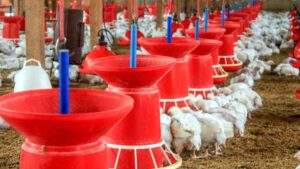No teacher or even a top public worker can make KES17 million in eight months- Farmer boasts of money he gets from chicken keeping
Bungoma's poultry farmer raises more than 10,000 birds, predominantly layers after he quit his teaching position to focus on his project.


Chicks feed on automated feeders at a Nyeri poultry farm
Many people have wished to quit their jobs and establish their enterprises, but those who were unprepared have failed.
As a teacher, Mr Michael Kibuuka used to earn KES20,000 every month. He achieved exceptional profits, though, when he got into chicken farming.
Kibuuka failed to create any substantial savings from his monthly pay during his ten years as a primary school teacher, preventing him from building a house, sending his children to reputable schools, and living a comfortable life.
Bungoma’s poultry farmer now raises over 10,000 birds, mostly layers.
A modest start
Kibuuka lacked the capital to launch the business he hoped would pull him out of poverty and enable him to save for a one-acre plot of land he planned to buy.
“I needed to establish a poultry farm but only had KES100,000 in the bank, so I decided to join the Naads program, which agreed to supply me with 500 layers in exchange for building a chicken coop,” explains the 35-year-old farmer.
He claims he and his wife, Annet Namugga, a teacher, erected a mud and wattle chicken cage and purchased chicks and five bags of layers mash to feed them.
Kibuuka’s wife, Ms Namugga, later abandoned her teaching job to focus on caring for the chicken owing to the amount of effort and tight monitoring that comes with poultry keeping.
Total Earnings and Re-investment
After five months, the birds began to lay eggs. “Every day, I collected at least 16 trays of eggs, which I sold for between KES4,800 and 5,000 each tray, depending on market demand,” Kibuuka explains. “I made roughly KES8m during the eight months that the chicken was producing eggs, and I used some of that money to acquire another 1,050 layers so that I could develop my company,” he adds.
He states that each off-layer was sold for KES6,000. Kibuuka continues, “I used some of the money to repair and refurbish my house, as well as to build a two-story chicken coop manufactured locally.”
He makes over KES17 million from the 10,000 layers in only eight months. “No teacher, even top public workers, can make so much money in eight months,” Kibuuka boasts.
Economies of Scale
He fertilizes his garden with chicken droppings and coffee husks, which has resulted in a nice yield. Kibuuka’s current issue is a lack of a nearby supply of water from which he can provide water for his chicken to drink.
“Every day, I use 30 jerry cans of water, which costs around KES5,000. I want to dig a borehole to fix this problem,” he revealed.
His other issue is a shortage of transportation for his agricultural supplies, particularly feed components, from wherever he obtains them.
Kibuuka intends to extend his initiative to more than 15,000 layers to meet the ever-increasing demand for eggs.
Final Thoughts
In the long term, layer farming on a big scale will be more profitable and generate more money than broiler farming since the birds may be sold as meat after producing eggs, albeit at a lower price than broilers.



